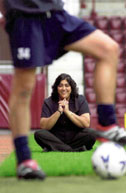
Movie Guru Rating:

Comment
on this review
| |

Bend it Like Beckham—a goal for true girl power
by Coury Turczyn
Of all the fatuous marketing terms foisted upon us by our corporate media overlords, none in recent memory has been more outrageously disingenuous than "girl power." At first, you might think the phrase goes beyond mere product branding and enters the realm of cultural change—that perhaps girls are at last being provided with entertainment role models that show them the possibilities of self-determination, just like boys have had forever. But when you take a good look at the pop stars that have been labeled as "girl power" promoters, you can only reasonably think, "Ecccch!"
* Britney Spears: Lyrically, her prevailing message seems to be that she's horny yet too young to do much about it. In performance, she leaves little doubt that she's not too young to understand how to capitalize on pedophilic imagery. Really, how does a teenage girl writhing half-naked while stroking a live snake and moaning "I'm a Slave 4 U" engender feelings of empowerment—other than for middle-aged guys?
* Christina Aguilera: While blessed with more vocal talent than the unfortunate Ms. Spears, girl-power competitor "X-tina" chose to express herself on her latest album Stripped by mostly trying to out-skank Britney. And she succeeded! A great lesson for all of her prepubescent fans.
* The Spice Girls: While no longer performing together, the Girls still loom over the girl-power trend like benevolent godmothers, simply because they repeatedly trilled "Gimme what I want, what I really really really want!" in their hit single, and because they would often randomly shout out "Girl power!" at interviews. From this, revolutions are born.
Sadly, Hollywood hasn't offered much real empowerment for girls, either. Britney's and the Spice Girls' movies were mostly about, uh, driving around and being silly. Nickelodeon star Amanda Bynes heads over to England in the current What a Girl Wants to stir up those Brit bluebloods with her mild sassiness (very similar to 2001's sassy-girl-goes-to-Europe flick The Princess Diaries, not to be confused with the upcoming The Lizzie McGuire Movie, wherein the equally sassy Hilary Duff goes to, um, Europe). While these may be innocuous studio fantasies, there haven't been many realistic movies showing girls making true accomplishments or experiencing honest adventure (last year's girl-surfer epic Blue Crush being one of the few exceptions).Enough of the giggly, boy-hungry, belly-button-exposing girly-girls. Where are the fast-thinking, odds-beating women-in-the-making that girls can genuinely relate to or be inspired by?
For the most part, they're in movies made outside of Hollywood. Bend it Like Beckham, a British film directed and co-written by Gurinder Chadha, offers a refreshing dose of reality in its tale of true girl power. While the gist of the story is as old as the Hollywood hills—a teenager pursues personal dreams despite parental disapproval, thus learning important lessons—its setting, its characters, and its convictions have little to do with Hollywood's conception of "what a girl wants." The girls in Beckham want to be true to themselves, not simply fulfill the cultural roles expected of them.
Parminder Nagra stars as Jess, the youngest daughter in a Sikh Punjabi family living in London. With the opening scene, we quickly learn that Jess is an unusual girl: She literally dreams of teaming up with David Beckham, England's foremost football (soccer) star—not as his girlfriend, as many British girls might, but as his equal on the field. Unfortunately, her reality offers little hope of achieving that particular ambition. Jess' parents are old-country traditionalists who believe a university education and marriage are her best (and only) options.
While she is often allowed to play football with some of her male friends, she's usually the main object of their ribbing. What's more, her Valley Girl-esque sister Pinky (Archie Panjabi) is about to be married—which inspires their mother to start training Jess for her own future wifely duties with dreaded cooking lessons. But when soccer-player Jules (Keira Knightley) spots Jess playing in the park one day, she invites her to try out for her all-girl team.
This opportunity opens up all sorts of conflicts—between Jess and her parents, between the Indian and British cultures she traverses, between male and female roles, between her sense of duty to her family and to pursuing her dreams. While this sort of coming-of-age scenario has resulted in many an outpouring of movie treacle, Chadha firmly anchors Beckham in its Brit-Indian milieu with such detail and humor that it feels true to life rather than melodramatic. And Nagra's performance as Jess is movingly naturalistic; unlike many American teen-idols-turned-actors, she feels no compunction to act "zany" to win over her audience. She's simply a girl who loves to play soccer, and you believe it.
While Beckham feels a tad overlong with perhaps one too many sub-plots (both Jess and Jules fall in love with their coach, played by sneery Jonathan Rhys-Meyers, of all people) and one too many characters (Jules' mother, played by Juliet Stevenson, inspires a devout wish to reach into the screen and throttle her), it's nevertheless good fun. When the expected ending arrives—yes, Jess wiggles her way to her objective, not unlike a David Beckham goal-shot—it nevertheless feels genuinely uplifting. Which is what feel-good movies are supposed to do.
Bend it Like Beckham is the kind of movie that might inspire girls to do more than just shop at the mall and talk about boys (which seems to be the main messages of grade-school superstars Mary-Kate and Ashley) or follow the fashion cues of our reigning pop stars. Who knows—maybe if Britney or Christina see Beckham, they might be inspired enough to empower themselves to stop stripping for money.

April 17, 2003 * Vol. 13, No. 16
© 2000 Metro Pulse
|